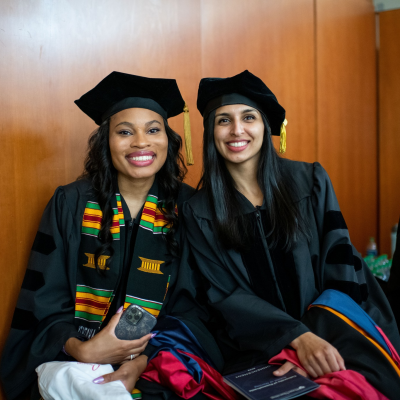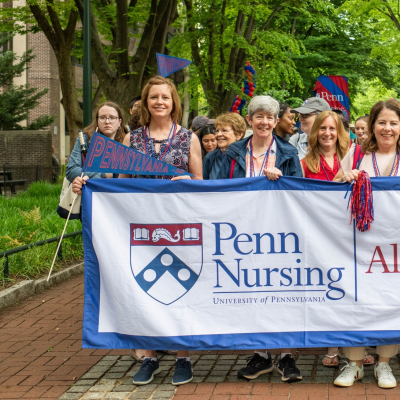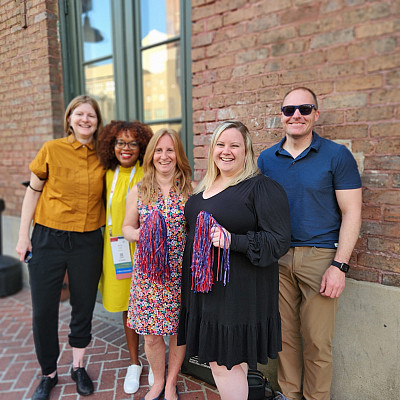Penn Futures Project Leaves Lasting Impact
Penn’s unique cross-school collaboration, the Penn Futures Project, leaves impact on education, research, and Philadelphia.
March 27, 2023

Strengthened partnerships with the City of Philadelphia, new professional training models, curricular innovations, and research publications are among the many outcomes of the Penn Futures Project.
Established in 2015, Penn Futures launched a collaboration among the University’s Graduate School of Education (GSE), School of Nursing (SON), and School of Social Policy & Practice (SP2) to leverage interdisciplinary expertise to better support young people and their families. While the project officially wrapped up in the summer of 2022, its successes, lessons, and impact will continue for many years to come.
From the inception of the Penn Futures Project, the deans of the three partnering schools were united in addressing the compounding challenges of health, education, and social conditions that limit opportunities for youth and families in historically marginalized communities. Simultaneously, they wanted to create a multi-disciplinary model for University research, practice, and policy that could contribute to meaningful and positive change.
“The challenges that schools are facing go well beyond the schoolhouse, and the opportunity to collaborate with Nursing and SP2 was an important way to address the multiple challenges facing children and their families,” said Dean of Penn GSE and George and the Diane Weiss Professor of Education Pam Grossman.
The Penn Futures Project began by providing seed funding for projects while bringing together faculty, students, and staff across the three schools. This cross-disciplinary approach to tackling the diversity of issues experienced by youth and families also meant working with Philadelphia city officials to develop approaches that serve vulnerable populations and communities beset with intractable problems, from structural racism to economic insecurity. It also engaged practitioners, strengthened practice, and supported families through multiple venues, such as school-based initiatives, health and pandemic-related programs, and child welfare-serving institutions.
“Working with our communities and local leaders to identify challenges and develop innovative solutions has been the hallmark of the Penn Futures Project,” said Margaret Bond Simon Dean of Nursing Antonia M. Villarruel. “I am very proud of all that Penn Nursing students and faculty—alongside our partners at Penn and the City—have accomplished and learned. This project has been an important factor in improving life for all Philadelphians, particularly during the early years of the COVID-19 pandemic, when investment in health was needed most.”
A critical dimension of the work the Penn Futures Project set out to achieve was not only to draw on emerging and ongoing research and practice-based initiatives across the three professional schools, but also to transform graduate education within and across the schools.
“The work of Penn Futures reflects the possibilities for building commitments across schools and interests to support our neighbors and the City. The early childhood projects were excellent examples of the power of collaboration to address the persistent policy challenges faced by the City and to provide support to local practitioners and programs as they navigated the difficulties created during the early days of the COVID-19 pandemic”, said Vivian Gadsden, Penn Futures faculty co-director.
The Penn Futures framework of interdisciplinary programs and City-University partnerships was designed to reimagine how universities could support families, train professional service providers, and work with policymakers—ultimately serving as a blueprint for similar work across the country.
“We are very proud of the ways in which faculty and students from Penn’s School of Social Policy & Practice (SP2) have contributed to the initiatives of the Penn Futures Project, grateful for the impact this work has had and will continue to have on campus and in the local community, and aware of the complex challenges that remain within the project’s areas of focus,” says Dr. Sara S. Bachman, dean of SP2.
The funded projects demonstrate both the opportunities and possibilities for change and the complexity of on-the-ground and institutional change. Concerns related to racial discrimination and systemic barriers continue to affect a large percentage of youth and families in Philadelphia. While Penn Futures took innovative steps in addressing these concerns and problems, the project also clearly demonstrates that these are areas in which considerable effort is needed to create quality, sustainable change.
Highlights of the Funded Cross-School Projects
Enhancing Child, Family, and Community School Readiness in Philadelphia
In partnership with the City of Philadelphia, this policy-focused project has aimed to provide actionable intelligence to enhance school readiness citywide for children from birth to age five. Its three sub-projects supported the city’s expansion of high-quality prekindergarten, supported the enhancement of the city’s integrated evidence-based data model, and examined social determinants of health deemed most relevant by community stakeholders to the well-being of children entering school. Since 2019, a collaboration with the Chicago Parent Program (CPP), an evidence-based parenting program that strengthens parenting skills and improves young children’s behavioral health has been integrated in a West Philadelphia day care center.
“Learning Central Preschool deeply values its long-term relationship with Penn Nursing and ongoing community partnership with Penn Futures faculty and students, in offering the Chicago Parent Program to our families and surrounding community. Forming strong bonds with children and parents are among our primary goals at LCP and the Chicago Parent Program has been an excellent initiative to build supportive and responsive relationships with primary caregivers outside of our learning environments. CPP provides an amazing opportunity to share the positive and challenging experiences of parenting, and to learn a wide range of techniques to redirect children, and create more positive outcomes and deeper connections. Partnering with Penn Futures on the Chicago Parent Program has worked out wonderfully so far and we hope in continues.”
–Regi Huc, Executive Director of Learning Central Preschool
Preparing Leaders in Child Welfare and Child Advocacy
Engaging the three Penn Futures schools as well as Penn Carey Law and Perelman School of Medicine, this program developed an interdisciplinary graduate-level certificate in child advocacy and welfare that spans the five schools. The team also worked with Penn’s Online Learning Initiative to develop the MOOC “Interprofessional Collaboration in Child Welfare and Child Advocacy.”
Serving LGBTQ Youth and Families
This project focused on preparing professional students to work with LGBTQ populations and to broadly address issues of gender identity and sexuality. It undertook and contributed to discussions, advocacy, a three-school LGBTQ certificate program, and the development of a new Nursing course, “Health of Sexual and Gender Diverse Individuals and Populations Across the Lifespan.”
Supporting Mental and Medical Health for LGBTQ Teens Through Interprofessional Simulation
This program used simulation as a powerful learning tool to support collaborative training and developed training videos and guides that were prepared for dissemination within and beyond Penn.
Partnering with Kensington Health Sciences Academy (KHSA) Through Graduate Field Practice
This project successfully pioneered a “whole child” approach to training and practice, accounting for the intellectual, emotional, and physical well-being of the student within and beyond KHSA, a community school in Philadelphia with medical-focused career programs.
Neighborhood Strategies Initiative
In addition to supporting Penn-based projects, faculty leaders, Gadsden and Lipman, forged ongoing relationships with communities as part of their Neighborhood Strategies initiative. The Initiative was designed to provide seed funding and support for community members to create and implement meaningful projects to their communities and to collaborate with community leaders across different neighborhoods. The concept of neighborhood was the area of focus to reflect the significance of neighborhoods in Philadelphia and also to be conversant with research that addresses neighborhood disparities. Neighborhood Strategies has sought to support neighborhood leaders in the neighborhoods of Kingsessing, Cobbs Creek, Mill Creek and Mantua. The Initiative yielded several rich partnerships, including a pop-up community-kitchen for Mill Creek, spiritual support, safety efforts, and a literacy program for youth for Cobbs Creek, a music program in collaboration with a local school in Kingsessing, and a memorial mural in Mantua. The neighborhood projects, similar to the research, practice, and policy relationships forged over the course of Penn Futures, demonstrate the power of coordinated efforts toward change and mutual respect.
“After the social unrest of 2020 and the onset of the COVID-19, we renewed our commitment to the foundational element that distinguishes the Penn Futures Project—active community involvement in defining problems and finding solutions.”
“Penn Futures embraced a strength-based approach and learned so much from resilient communities that have been able to thrive in the face of immense challenges,” says Terri Lipman, Penn Futures faculty co-director. “After the social unrest of 2020 and the onset of the COVID-19, we renewed our commitment to the foundational element that distinguishes the Penn Futures Project—active community involvement in defining problems and finding solutions.”
The teams’ efforts have resulted in several internal grants and have or will lead to almost ten publications (both those released and in preparation) as well as conference and meeting presentations.








